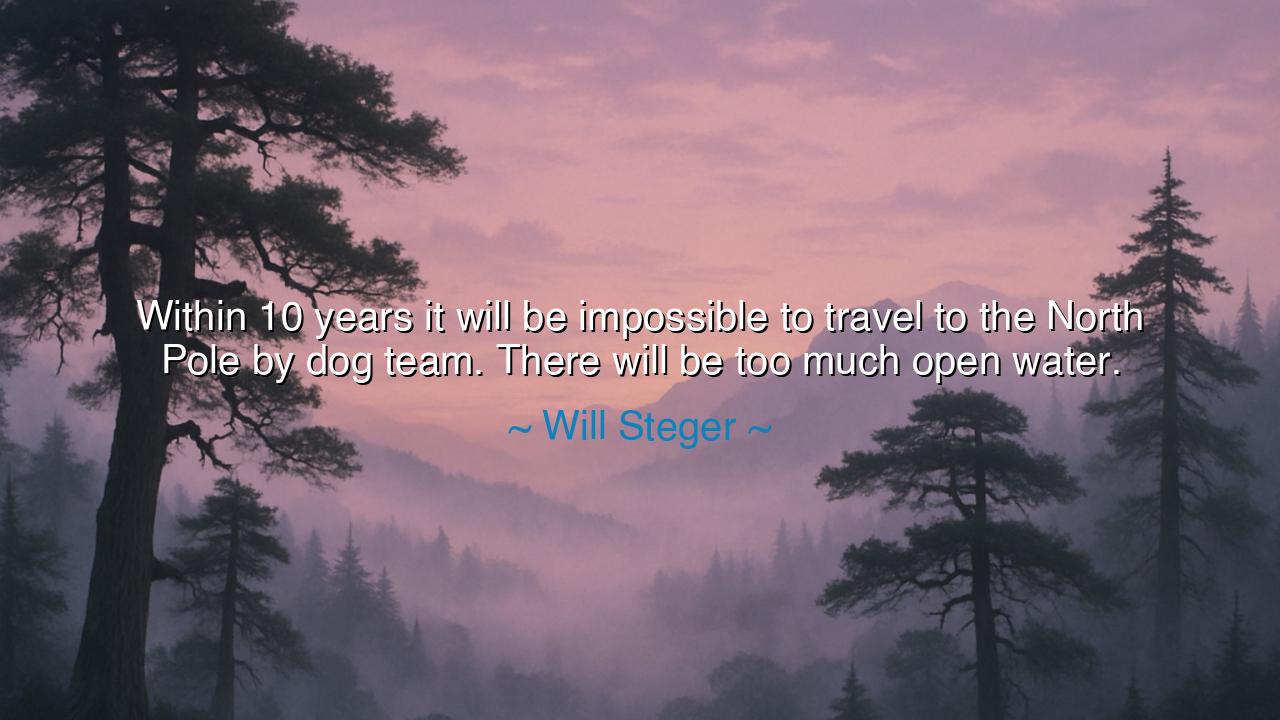
Within 10 years it will be impossible to travel to the North Pole
Within 10 years it will be impossible to travel to the North Pole by dog team. There will be too much open water.






When Will Steger proclaimed, “Within 10 years it will be impossible to travel to the North Pole by dog team. There will be too much open water,” he spoke not merely as an explorer, but as a prophet of the Earth’s changing face. His words are both lament and warning—a cry from the ice itself, echoing through the corridors of human conscience. Steger, who had ventured across frozen continents and witnessed firsthand the power and fragility of the Arctic, did not speak in metaphor. He spoke from the realm of lived truth, from the desolate beauty of a world slipping away beneath the heat of human progress. His warning was not of adventure’s end alone—it was of climate unraveling, of a balance broken, of nature’s ancient rhythm faltering beneath the weight of man’s unceasing appetite.
In the ancient way of teaching, this quote reminds us that when the ice retreats, it is not merely water that is lost, but memory itself. For thousands of years, the polar world has been the guardian of purity and endurance, a mirror of Earth’s resilience. To cross it by dog team was to walk upon history—to hear the wind of millennia whisper across the snow. Steger’s words, then, are an elegy for more than a journey—they mark the passing of an era. The dog team, symbol of cooperation between man and nature, can no longer tread the paths it once knew, because the ground beneath it—the frozen heart of the world—has melted into uncertainty. What once was solid now moves like sorrow, and the very geography of heroism dissolves into open water.
To understand the depth of this warning, we must recall the lineage of explorers who braved the white silence. Men like Roald Amundsen and Robert Peary, who in the age of sail and sled pursued the pole with grit and grace, staking their lives upon the endurance of ice. Their journeys were acts of faith in the constancy of nature—the belief that the polar cap was eternal, unyielding, a fixture of creation. But in Steger’s time, that faith began to crumble. The ice that had carried empires of exploration was thinning, breaking, vanishing. He saw cracks where none had been, water where once was only frost. His prophecy—“within 10 years”—was a measure not of distance, but of decline. It was the countdown of an ecosystem.
The ancients would have called this a sign from the gods, a punishment for hubris. For as mankind learned to harness fire, to bend rivers, to conquer mountains, it also forgot reverence. The smoke that rose from industry did not remain in the cities; it drifted northward, settling upon glaciers, darkening the snow, absorbing the sun’s light. The ice, once the emblem of eternity, began to melt faster, bleeding into the sea. Steger’s warning, spoken in the voice of a traveler, was in truth a revelation of imbalance. He stood not as a scold, but as a witness—a man who had touched the Earth’s sacred stillness and returned to tell that its silence was breaking.
Yet his words also carry hope, for to see loss clearly is to begin the work of redemption. If the dog teams can no longer tread the pole, perhaps humanity must find another way—not of conquest, but of care. Steger’s message calls us to humility: to learn once more the art of listening to the Earth. Like the explorers of old who charted by the stars, we must now navigate by conscience, guided not by greed but by gratitude. The open water he foretold can drown us in despair—or it can become the mirror in which we finally see ourselves as we are: children of a fragile world, entrusted with its keeping.
There are echoes of this truth in the story of the Greenland Inuit, whose ancestors lived for millennia in harmony with the ice. They read its texture as one reads a sacred text, understanding each creak and shimmer as a language of survival. Now, their traditions falter, their hunting paths vanish, and their wisdom—built upon a foundation of snow—faces extinction alongside the ice itself. This is the living consequence of Steger’s prophecy: when the ice melts, it is not only nature that suffers, but culture, identity, and memory. The loss of the Arctic is the loss of a teacher—a vast, silent mentor that showed humanity how to endure.
Let this be the lesson passed down through the ages: the Earth remembers, even when we forget. Every melting glacier, every vanished path, every drowned coastline bears witness to our choices. Steger’s words are not meant to condemn, but to awaken. They remind us that change, though inevitable, need not be destruction—if met with wisdom, reverence, and action. The time to act is not when the water has already risen, but now, when the ice still whispers its last pleas. So listen, as Will Steger listened. Learn, as he learned. For in the end, the measure of humanity will not be in how far we traveled, but in how gently we walked upon the Earth that carried us.






AAdministratorAdministrator
Welcome, honored guests. Please leave a comment, we will respond soon